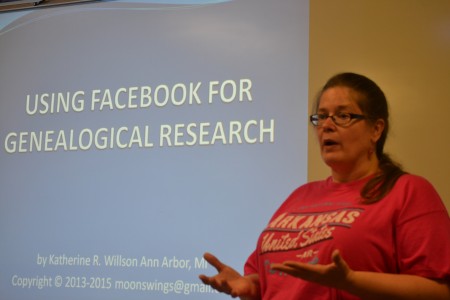
By Andrew Cluley
AAPS Communications Specialist
Alona Moon will likely soon know more about her deceased husband’s family than he ever did, thanks to a class offered by Ann Arbor Public School’s Community Education and Recreation. Moon should soon get her husband’s adoption records unsealed for medical reasons. She says Genealogy 101 teacher Katherine Willson is helping her solve the mystery. “I didn’t know how to even begin so that’s been the value of this class, and Katherine’s been so willing to share her expertise,” Moon says.
Willson says a couple of years ago students went through a similar experience and ended up meeting their father’s birth siblings they never knew existed. She explains it’s this type of breakthrough that keeps genealogy exciting. “I love it whether it’s my family or my students, because it’s the thrill of the hunt, it’s like a puzzle,” Willson says.
Willson teaches a pair of genealogy classes through Rec and Ed, Genealogy 101: Computer Research and Genealogy 201: Beyond the Computer. She says all of the advertisements for websites like Ancestry and the television show “Who Do You Think You Are?” is leading to a boom in genealogy. But Willson says the ads can be deceptive and make people think it’s easy to go back four or five generations. She says it’s important for people to learn the methodology behind genealogy or they will likely be disappointed with the amount of information they can find.
It’s the first word of caution Willson gives students in genealogy 101. She also lets them know that the Internet is a powerful tool, but still won’t give them all of the information they may be looking to find. “I tell them on the very first day of class that 90 percent of what you’re looking for isn’t online, but I’m going to help you find 10 percent,” Willson says.
For many of the older students in Willson’s class getting online can be a challenge. Her lessons can ease these concerns, and can provide tips to help students that are already comfortable with the Internet, like Atoya Martin. “I thought I knew my way around the internet, you know, spent countless times on the internet but finding out different ways to use Google, things that I use,” Martin says. “It’s really interesting to me to find out new techniques.”
Martin took the class because her son wanted to know more about his family. She’s excited about what she’s found so far. Martin knew her husband’s family came from the Bahamas and found online when her son’s great-grandfather came to the United States. “We were able to find paperwork from 1911 that had his naturalization papers and things like that,” Martin says. She also has learned her mother’s maiden name by finding her marriage license online. Of course this just means there is more for Martin to research about her family.
Since only about ten percent of the information is available online, Genealogy 201 focuses on where else people can sleuth for information about their ancestors. The class helps students find where repositories are and how best to phrase a query to get desired information. Willson says some of these libraries and special collections can provide information for free, while others require payments for research.
The last few years have given genealogists a powerful new tool that gives indirect access to libraries and depositories of information across the world. Willson once thought Facebook had little value for genealogists. That’s exactly what she told a student, only to have to admit a week later that genealogy groups on the site can provide amazing assistance. A copy of a birth certificate she had been unable to find for a client through countless hours of research was sent to her overnight after she posted a question in a Facebook group. The key she says is getting connected with the people that know all of the resources available in their area.
These types of discoveries work both ways too. Alona Moon says she likes making connections with other people. She’s been able to provide assistance to a distant relative in the Netherlands. “He doesn’t have access to information in Michigan or even know the resources so I was able to uncover a lot of stuff for him, and he was thrilled to death,” Moon says.
The next chance for community members to learn new techniques in solving family mysteries comes in September when Rec and Ed offers Genealogy 101. The next Genealogy 201 class begins in November.

Be the first to comment